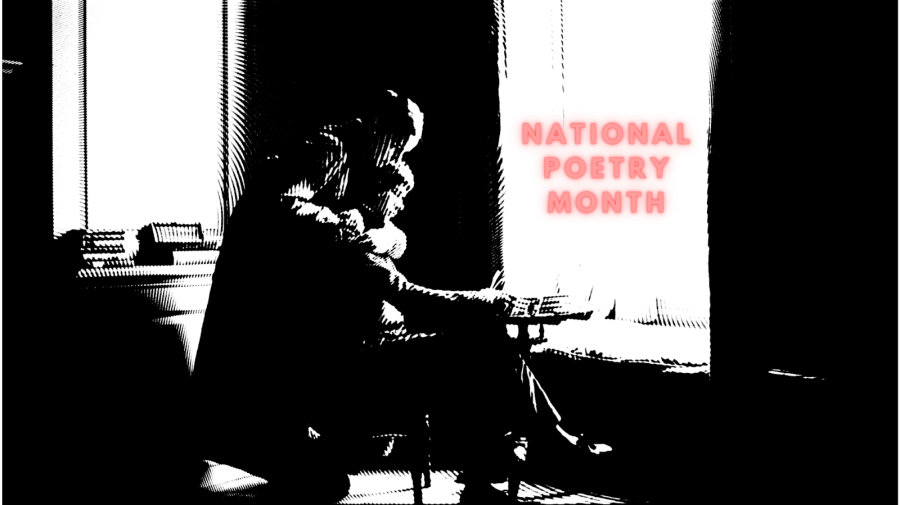To Let It Out and Take It Back Again

Whenever April comes around, and I realize that information technology's National Poetry Month, I go a lilliputian nervous. I'm a poet, and National Poetry Month makes me think about how fumbling and inarticulate I feel whenever someone asks me what I write poems virtually, or why I write poems, or what's so great virtually poems. It's not that the questions are unfair, of form; it'southward just that I don't know the answers. I brutal in dear with poetry at some point in my life, long before I knew what information technology was or how to make it. I know that poetry matters, merely it's hard for me to explain how or why.
This year, I'm thinking almost that difficulty as National Verse Month rolls around, and the springtime with it, and we sally — or, possibly, we don't emerge — from years of a piffling more social isolation than nosotros're used to. We're changing, and aye, we're always changing, but at the moment, as a culture, it seems to me that we're pretty uncomfortable virtually it. I believe verse might offering us some tools for embracing change, and so I'm going to requite that a try here by explaining why the medium matters so much.
Poetry Is Common and Everywhere
First, let'south deal with the problem of our general perception of poetry. We tend to call up of poetry as special or unusual, removed from the mundane happenings of everyday life. People read poems at special occasions like weddings and funerals, or they learn nigh the poems and poets assigned to them in English classes, or they come across $.25 of poetry memed in faux-inspirational Facebook posts.
I'grand not saying that stuff isn't poetry, but I'one thousand saying it's definitely non all of it. The primeval forms of poetry weren't written down but spoken aloud: not on the page, but in the body. Poetry was — and is — closely related to music, which we readily accept is capable of making us feel without necessarily making sense. It's thought that the earliest poems were cultural attempts to remember what needed to exist remembered.
Put all this together, and you begin to understand poetry as an entirely necessary slice of advice. It's an everyday thing. Similar every day of your life, verse'south full of experimentation and feeling. It's trying to say what needs to exist said but in a way that's new, full of life, and able to be remembered when we demand it well-nigh.
Learning What You Already Know
I've had the experience now and once again of going dorsum to expect at something I wrote years agone and realizing that it contains data I've been needing. When my grandmother passed away, I happened to observe an old verse form I wrote that had some lines most acceptance and memory. I'd been feeling overwhelmed and lamentable about her expiry, merely suddenly my own poem, coming to me from out of the past, seemed helpful. I felt almost like I time-traveled back to the past to make sure I jotted down the thoughts I'd need in the time to come. Most.

Poesy is useful in other ways, though. The way nosotros experience the world is completely entangled in the language we utilize to describe it. That language is largely metaphorical, and poesy is great at coming up with metaphors. When you lot take lost someone, your heart breaks. When you finally understand something, you meet the light. When yous're feeling wonderful, yous might even exist glowing. These statements are non literally true, but they feel even truer than truthful. The comparing amplifies the truth.
Information technology's fortunate for us that language works this manner, considering it means it's capable of irresolute equally it adapts to the fashion nosotros experience the world — equally our frames of reference change, and every bit our available comparisons change. Language adapts whether we resist that adaptation or not, but more and more, it seems to me that we're agape of changing. The pandemic, our politics, and a one thousand thousand other things have us using a lot of language about "getting dorsum to normal," but our ability to change is essential. Equally the poet Eleni Sikelianos puts information technology: "Poems maximize the adaptability of linguistic communication, and, every bit we know, adaptation is cardinal to animal survival."
Let Verse Change Your Heed This National Poesy Calendar month
The rules of language are always a little bit behind the people who utilise it. Grammatical rules are an attempt to capture a moment in time — to say, "Here's how we're doing it now." We're live, though. One time we've described "now," it's already in the past, and nosotros've moved on. Never listen the fact that there are thousands of languages operating with thousands of sets of rules.
This should exist both liberating and humbling. Nosotros should be gratis to play around in our language, to dispense it and alter information technology and run across if we can go far piece of work for us. On the other paw, nosotros tin never fully empathize information technology — it'due south an organic thing, living and changing in response to the world of which it is a office. Conversations around what pronouns people use make information technology articulate that this stuff produces a lot of cultural anxiety. I wish it wouldn't, and I call up poetry tin can aid.

I'll end with an example from a poem chosen "Facing It," by the peachy American poet Yusef Komunyakaa. In the poem, a veteran of the state of war in Vietnam is looking at his reflection in the wall of the Vietnam Veterans Memorial in Washington, D.C.
At the beginning of the poem, the veteran sees his face in the granite and thinks: "I'g stone." Then the rest of the poem happens. By the finish of it, he thinks: "I'm a window." Information technology's not that the hurting, or the horrors of state of war, or the cruelties of life have disappeared, it's just that the poem embodies a modify in the bearing of the person. I call up about that a lot — nigh the importance of knowing both that I can change my mind and that my heed can modify. This April, in one case once more, information technology feels good to be reminded.
Source: https://www.ask.com/culture/national-poetry-month-let-poetry-change-your-mind?utm_content=params%3Ao%3D740004%26ad%3DdirN%26qo%3DserpIndex
0 Response to "To Let It Out and Take It Back Again"
Post a Comment